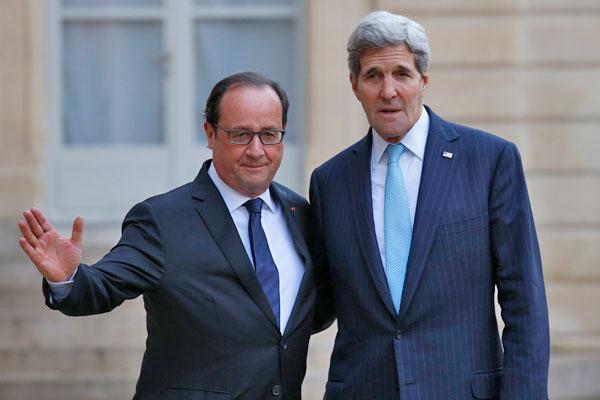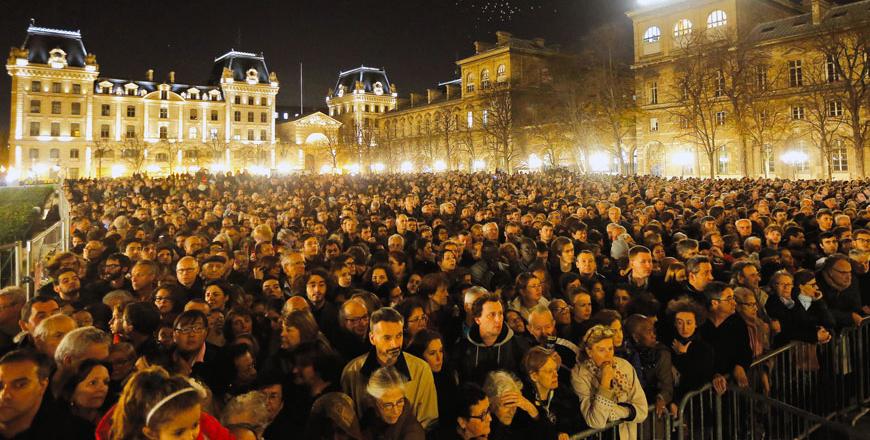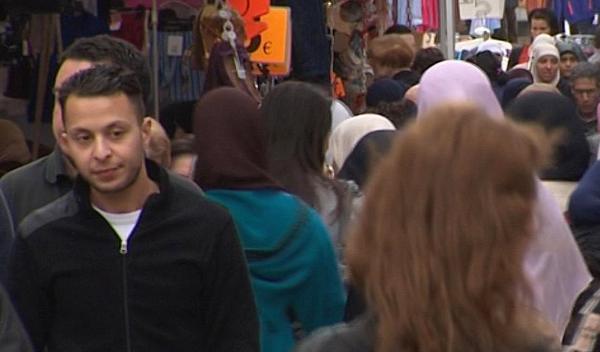You are here
Hollande outlines fightback against Daesh after attacks
By AFP - Nov 17,2015 - Last updated at Nov 17,2015

The Eiffel Tower is lit with the blue, white and red colours of the French flag in Paris, France, on Monday, to pay tribute to the victims of a series of deadly attacks on Friday in the French capital (Reuters photo)
PARIS — President Francois Hollande unveiled France's riposte to the Daesh terror group on Monday after its atrocities in Paris, vowing tough new anti-terror measures and intensified bombing of Syria in a historic speech to parliament.
Describing the coordinated attacks that killed 129 people as "acts of war", Hollande urged a global fightback to crush Daesh and said he would hold talks with his US and Russian counterparts on a new offensive.
Friday's "acts of war... were decided and planned in Syria, prepared and organised in Belgium [and] perpetrated on our soil with French complicity", Hollande told an extraordinary meeting of both houses of parliament in Versailles.
"The need to destroy Daesh ... concerns the entire international community," he told lawmakers, who burst into an emotional rendition of the La Marseillaise national anthem after his speech — only the second time in more than 150 years a French president has addressed a joint session of parliament.
On the domestic front, Hollande called for an extension of the state of emergency by three months and announced 8,500 new police and judicial jobs to help counter terrorism.
France and Belgium staged dozens of raids on suspected extremists as the manhunt continued for an eighth militant, including in a known radical hotspot in Brussels where some of the attackers are thought to have lived.
With emotions running high, thousands paused in the streets of Paris for a minute’s silence to remember those killed at nightspots and at the national stadium in the worst-ever attack on French soil.
Investigators identified two more extremists involved in the assault, including a Frenchman previously charged with planning a terror attack and a suicide bomber found with a Syrian passport, which has yet to be authenticated.
Russia’s President Vladimir Putin, speaking at a G20 conference in Turkey, said the attacks proved the need for an international anti-terror coalition.
“I spoke about this at the United Nations... and the tragic events that followed have confirmed that we were right,” he said.
US President Barack Obama, also in Turkey, said a new deal had been agreed with France to speed up intelligence sharing.
Rocket launcher
During pre-dawn raids in the southeastern French city of Lyon, police found “an arsenal of weapons”, including a rocket launcher and Kalashnikov assault rifle.
More than 100 people have been placed under house arrest, 23 arrested and 31 weapons seized, Interior Minister Bernard Cazeneuve said.
As authorities scrambled to find those responsible, the grieving French tried to return to the humdrum of daily life.
Mountains of flowers and candles have been laid at the scenes of the attacks and in front of businesses that lost loved ones.
“We need to understand how this barbarism can exist and why France is paying this heavy price,” David Boy, a 52-year-old advertising agency boss said, his lips trembling as he lingered at one of the memorials on his way to work.
Metro trains were packed with commuters, pupils returned to schools and museums reopened, although a national state of emergency remained in place.
A social media campaign urged everyone to visit cafes and bars on Tuesday night.
In the face of “barbarism... culture is our biggest shield and our artists our best weapon,” said Culture Minister Fleur Pellerin.
Prime Minister Manuel Valls steeled the nation for more bloodshed, telling RTL radio that more operations “are still being prepared, not only against France but other European countries too”.
Late on Sunday, French planes bombed the stronghold of the Daesh militants.
French jets hit a Daesh command post, a recruitment centre, a munitions depot and a training camp in Raqqa, northern Syria, and more raids were reported on Monday.
The Belgian connection
The manhunt continued for Salah Abdeslam, one of the three brothers linked to the attacks.
One brother blew himself up in the Bataclan and was identified from a severed finger, while the third was arrested in Belgium but released without charge.
The brothers lived in the rundown Brussels neighbourhood of Molenbeek, which has a reputation as a hotbed of militancy and where police have made several arrests.
Abdelhamid Abaaoud, a Belgian of Moroccan descent also from Molenbeek and thought to be fighting with Daesh in Syria, is considered a possible mastermind of the attacks.
Five of seven known attackers have been identified, but it is unclear if other gunmen fled after the outrage.
Two of the gunmen behind the bloodbath at the Bataclan theatre, where 89 people were killed, have been identified as Paris native Omar Ismail Mostefai and Samy Amimour.
A Turkish official said its police had twice warned France about Mostefai, who was one of 10,000 people tagged by French intelligence as an extremist.
Amimour was charged in France in 2012 for “conspiracy to commit terrorism” over a foiled plot to carry out an attack in Yemen and was wanted on a global arrest warrant after violating the terms of his judicial supervision.
There are fears some of the assailants entered Europe as part of the huge influx of people fleeing Syria’s civil war, after a Syrian passport was found near the body of one suicide bomber at the Stade de France in the name of Ahmad Al Mohammad.
The document has yet to be verified and Serbia detained a migrant on Monday whose passport contained the same data.
Far-right French leader Marine Le Pen has already called for an “immediate halt” to the intake of migrants.
The attacks came less than 11 months after militants struck satirical magazine Charlie Hebdo and a Jewish supermarket, killing 17.
Related Articles
Paris — France and Russia agreed Tuesday to coordinate their military and security services in an unusual alliance against the Daesh terror
PARIS/BRUSSELS — Two of the attackers who brought carnage to Paris were French nationals living in Belgium, officials said on Sunday, as a r
PARIS — Salah Abdeslam, believed to be the sole survivor among a group of militants who killed 130 people in Paris in November, was extradit














